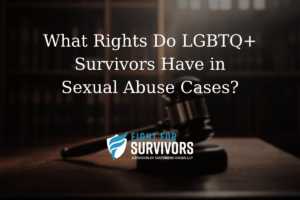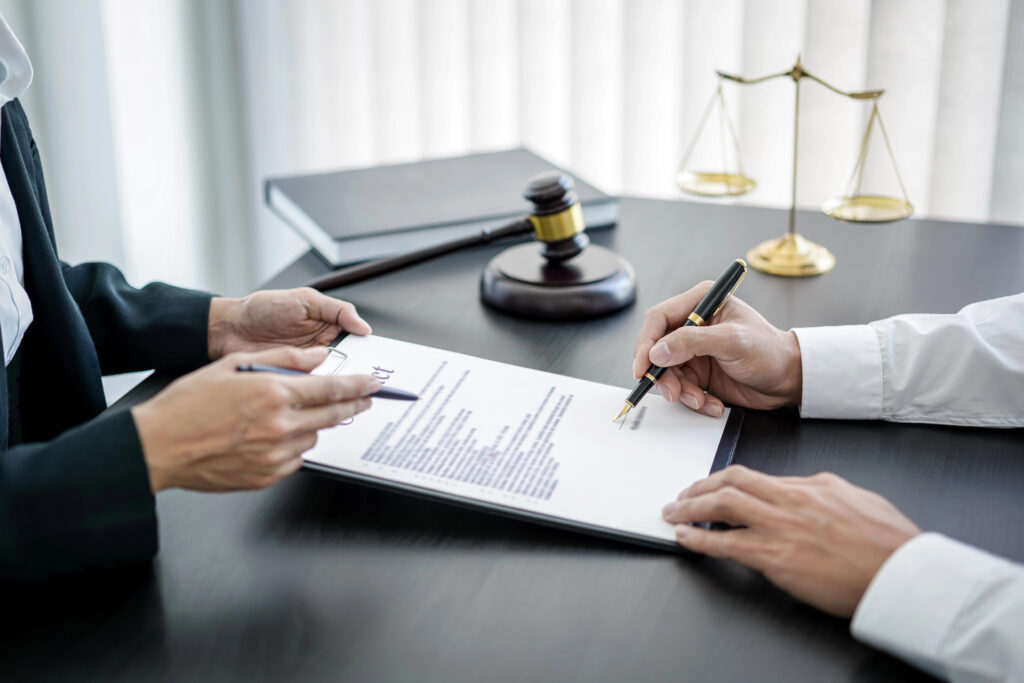
Survivors of sexual violence in the LGBTQ+ community face unique legal and societal challenges when seeking justice. Discrimination, societal norms, and a lack of LGBTQ cultural competency within the criminal justice system often make it more difficult for them to access the resources and support they need. However, LGBTQ survivors have legal rights and protections in sexual assault cases, ensuring they can seek justice and support without fear of discrimination.
Understanding these rights is crucial for survivors of sexual abuse, as well as for community members, advocates, and support groups working to end sexual violence.

The Reality of Sexual Violence in the LGBTQ+ Community
Research shows that LGBTQ people—including gay men, lesbian and bisexual women, bisexual men, and transgender individuals—face greater risk of experiencing sexual violence than the general population.
According to the National Intimate Partner and Sexual Violence Survey, rates of sexual coercion, unwanted sexual contact, and sexual harassment are disproportionately high among transgender people, bisexual women, and gay men. In addition, intimate partner violence affects LGBTQ+ relationships at similar or higher rates than heterosexual women and heterosexual men experience.
Despite these alarming statistics, many LGBTQ+ survivors of sexual assault do not report their experiences due to fear of discrimination, retaliation, or lack of appropriate services.
Legal Protections for LGBTQ+ Survivors of Sexual Violence
Although systemic barriers still exist, LGBTQ survivors have legal rights under federal and state laws that protect them from discrimination when seeking justice.
- Title IX prohibits sex-based discrimination in educational institutions, covering LGBTQ+ students who have been sexually harassed or assaulted.
- The Violence Against Women Act (VAWA) includes protections for LGBTQ survivors of domestic violence and sexual assault, ensuring access to support services regardless of sexual orientation or gender identity.
- The Matthew Shepard and James Byrd Jr. Hate Crimes Prevention Act recognizes hate crimes based on sexual orientation, gender identity, and gender expression, allowing for federal intervention in cases of bias-motivated violence.
- State-specific protections vary, but many states explicitly include LGBTQ individuals in their sexual violence laws, offering protections against discrimination in reporting, seeking legal action, and accessing survivor services.
LGBTQ survivors also have the right to seek medical care, protective orders, and legal representation without fear of discrimination based on sexual orientation or gender identity.
Barriers Faced by LGBTQ+ Survivors
LGBTQ survivors of sexual abuse often face additional obstacles when seeking justice and support, including:
- Discrimination from law enforcement and service providers, leading to a lack of trust in the criminal justice system
- Lack of LGBTQ-inclusive support services, including shelters and crisis centers that do not accommodate transgender individuals
- Fear of being outed, particularly for survivors who have not disclosed their sexual orientation or gender identity to family members or employers
- Societal stigma and victim-blaming, especially for survivors in same-gender relationships or those who do not conform to traditional gender roles
- Higher rates of homelessness and poverty, which can make it harder for survivors to leave abusive situations and access legal representation
Organizations like the Human Rights Campaign, the Transgender Law Center, and the Anti-Violence Project work to address these challenges by advocating for policy changes, providing legal support, and training service providers on LGBTQ cultural competency.

Seeking Justice and Support
LGBTQ survivors have the right to access survivor services without discrimination. Resources available include:
- LGBTQ-specific support groups, offering trauma-informed care tailored to the community’s needs
- Legal assistance from LGBTQ-friendly organizations, such as Basic Rights Oregon and the National Center for Victims of Crime
- Technical assistance providers that offer guidance on navigating the legal system as an LGBTQ survivor
- Crisis hotlines and LGBTQ organizations that specialize in helping survivors of sexual assault and intimate partner violence
If you or someone you know has experienced sexual violence in California, coming forward can be difficult, but there are support systems in place to help. Whether through legal advocacy, therapy, or community resources, LGBTQ survivors deserve justice and healing.
Frequently Asked Questions
Do LGBTQ survivors have the same legal rights as heterosexual survivors?
Yes. Federal and state laws protect LGBTQ survivors from discrimination in accessing legal, medical, and support services. However, the level of protection can vary depending on the state.
Contact Us For A Free Legal Consultation. No Fee.
Call (833) 55-FIGHTAre there LGBTQ-specific shelters for survivors of domestic violence and sexual abuse?
Some organizations provide LGBTQ-inclusive shelters, but access can be limited. Contacting LGBTQ organizations and legal advocacy groups can help find safe housing options.
What should I do if I experience discrimination when reporting sexual assault?
You can file a complaint with the Department of Justice or reach out to LGBTQ advocacy groups that offer legal support for survivors facing discrimination.
How can I support an LGBTQ survivor of sexual violence?
Listen without judgment, help them find LGBTQ-friendly resources, and advocate for policies that improve protections for LGBTQ survivors.
LGBTQ survivors deserve to be heard, believed, and supported. If you or someone you know is experiencing violence, reach out for help—there are people and organizations ready to stand with you.
Experienced Attorneys Who Will Listen And Fight For You
Speak To An Attorney Now »